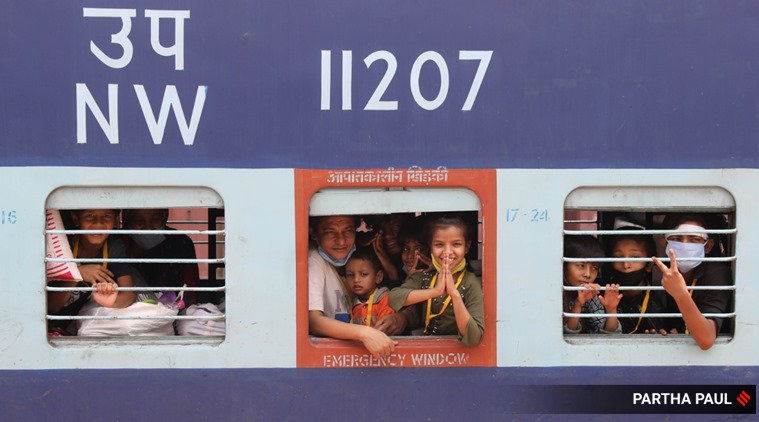 There are about 10 lakh inter-state migrant workers, and a majority of these want to leave for their homes if trains are arranged for them.
There are about 10 lakh inter-state migrant workers, and a majority of these want to leave for their homes if trains are arranged for them.
While thousands of migrant labourers in Tamil Nadu remain clueless about returning to their native villages in Odisha, Bihar, Jharkhand, West Bengal and Rajasthan amid confusing signals from the government, industries in the state are also anxious of the possibility of a huge labour scarcity — a concern reflected in the exit strategies of the state government.
According to a survey by Tamil Nadu’s labour department, there are about 10 lakh inter-state migrant workers, and a majority of these want to leave for their homes if trains are arranged for them.
Cases rise, Tamil Nadu liquor shops open to long queues
The state government has declared strategies for industrial clusters in the state, setting different work strengths — ranging from 20% to 50% — for industries in rural and urban areas to start operations.
What has helped Tamil Nadu avoid a massive exodus of migrants so far during the lockdown is a fairly good environment sustained by the government, civil society and employers even in the absence of jobs and non-payment of wages.
However, for many, it will be difficult to continue like this for long. “It’s been more than a month. There is no job either,” said Mintoo Kumar, in his early 30s, among 100 migrants stranded at Otteri in Chennai. Kumar, along with other workers from northern states, has been sheltered near a police colony with enough food and provisions and is trying to seek help from the authorities to catch a train for his home in Bihar. “They promised that they will arrange but no final word yet,” he said. “Food and shelter alone will not solve problems.”
The industries are also worried. Mohan C K of Tamil Nadu Small and Tiny Industries Association, a consortium of 150 associations representing thousands of small and micro industrial units, said most of the industries have failed to pay wages for April. “There may be 20 to 40 percent of migrant workers in our factories… if they go to their states, they may not be going to come back for the next two or three months. That will affect our industrial operations… the majority had no money to pay wages as there was no production last month,” he said, referring to over 10 lakh industries in the state.
T Venkat, who conducted a random survey among migrant workers after the lockdown, said his team was able to track about 18,000 workers — half of them stranded in Chennai city. “There are many more in Sriperumbudur industrial area. Some of them are ready to stay back while many are worried of their plight if there is a similar outbreak again,” he said. “If transport is arranged, 70 to 75 percent of migrant labourers in the state will return back to their states even as Tamil Nadu had taken some effort to comfort them,” he said.
The state government’s strategy has been clear: silence about trains, instructions to local bodies and police teams to provide provisions, engaging civil society and NGOs in some areas to keep workers entertained with televisions or ensuring their phone recharge, quick intervention in any protest or gathering of migrants.
In a televised address two days ago, CM Edappadi K Palaniswami said trains will be arranged next week for migrant workers. However, the number of those who would want a ride may be in thousands, and government sources said they will do their best to keep all of them comfortable in Tamil Nadu.
S Irudaya Rajan, an expert in migration studies at the Centre for Development Studies in Thiruvananthapuram, said COVID-19 has only made migrants more visible. “Now the governments have realised… that it is important to keep them in good humour and take them in confidence… everyone may not return after this outbreak, which would definitely trigger a labour scarcity,” he said.